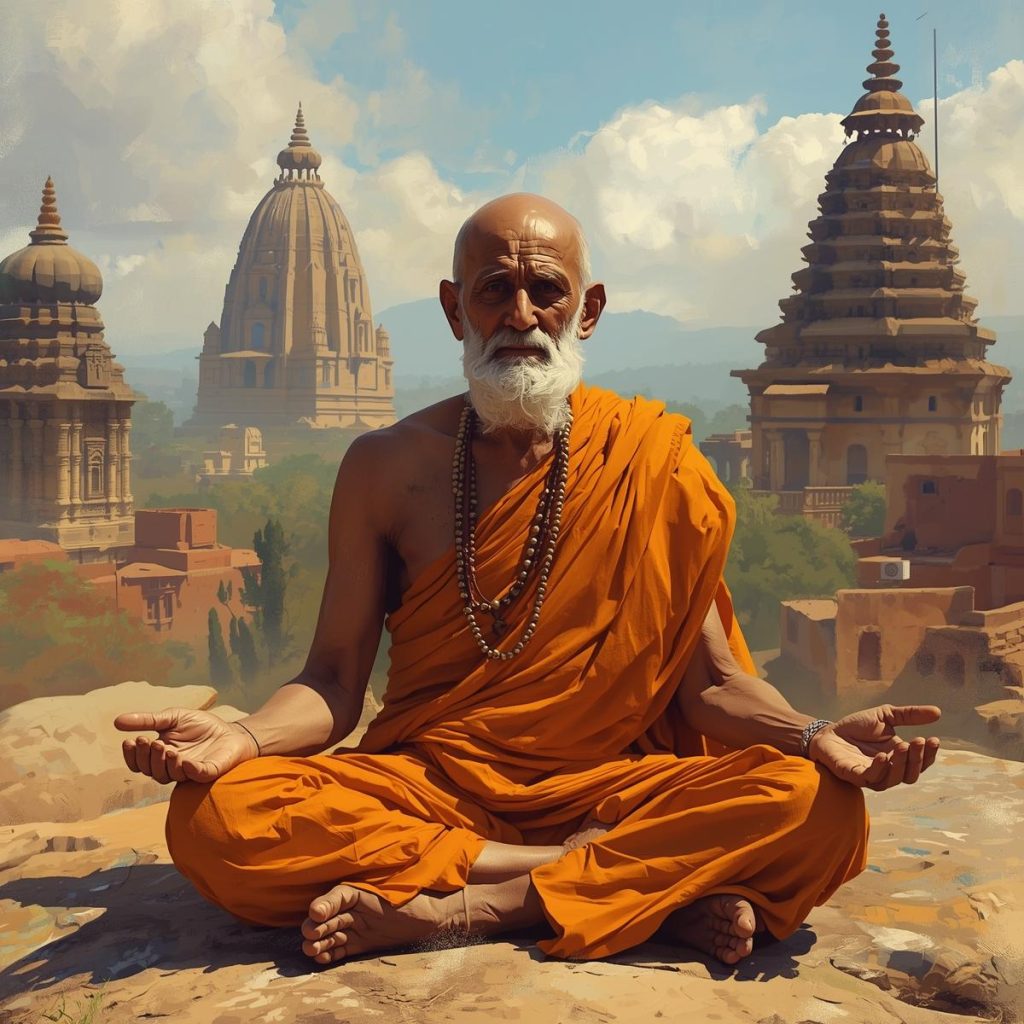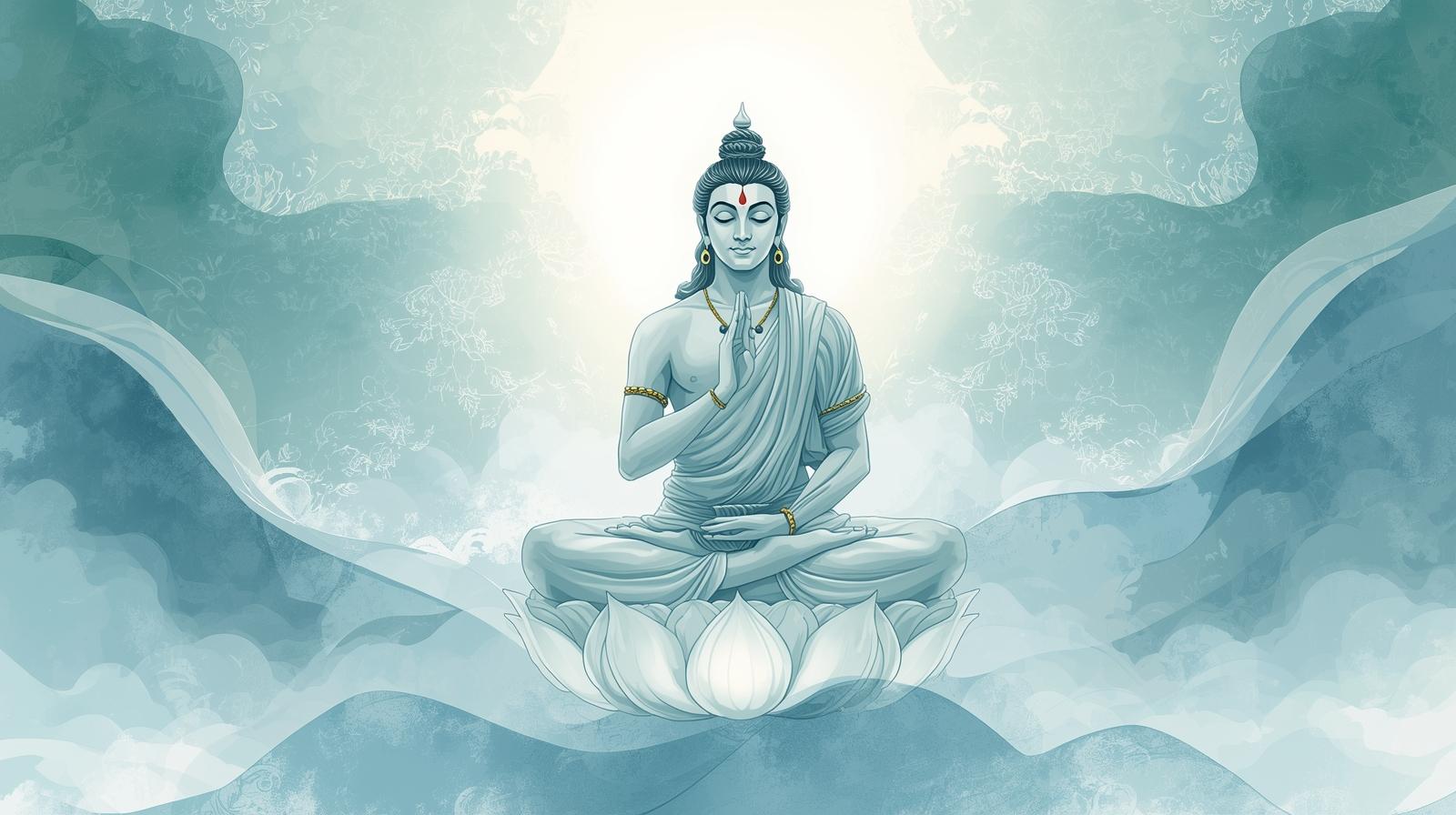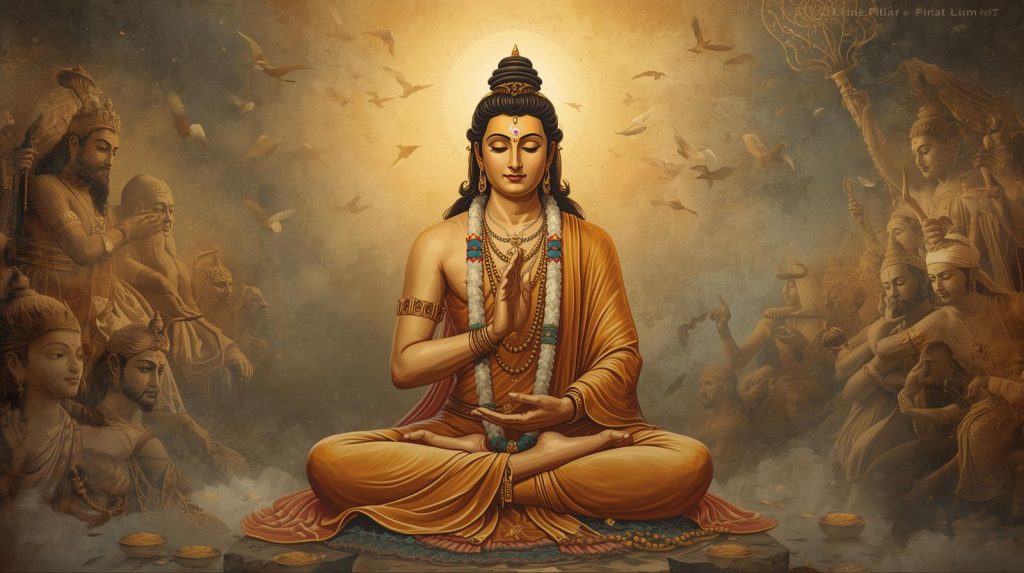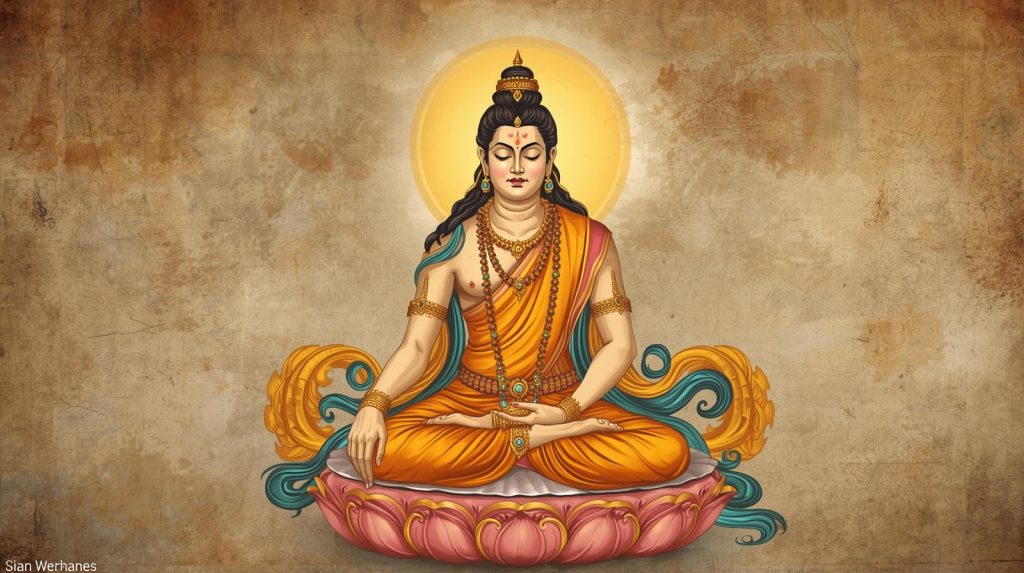The Five Sacred Principles
Fundamental teachings for righteous living and spiritual evolution
Ahimsa
Non-Violence
Ahimsa is the cornerstone of Dharmanath’s teachings – the complete abstinence from causing harm to any living being through thought, word, or action. This principle extends beyond physical violence to include mental and emotional harm.
True ahimsa cultivates compassion, empathy, and reverence for all life forms. It teaches us that every soul, regardless of its current form, is on a journey toward liberation and deserves respect and protection.
“The soul that practices true ahimsa radiates peace and becomes a sanctuary for all beings.”


Satya
Truthfulness
Satya encompasses absolute truthfulness in thought, speech, and action. It means speaking only what is true, beneficial, and necessary. Truth is not just about factual accuracy but also about authenticity and sincerity.
Dharmanath taught that truth is the foundation of trust and spiritual progress. A truthful person becomes a beacon of reliability and their words carry the power to heal and inspire others on the spiritual path.
“Truth is the light that illuminates the path to liberation and dissolves all illusions.”
Asteya
Non-Stealing
Asteya means complete abstinence from taking what is not given, whether material possessions, time, credit, or even thoughts. It extends to not wasting resources and being grateful for what we have.
This principle teaches contentment and self-sufficiency. When we practice asteya, we develop inner abundance and the universe responds by providing what we truly need for our spiritual journey.
“The soul that desires nothing unlawfully becomes a magnet for divine abundance.”


Brahmacharya
Celibacy & Self-Control
Brahmacharya involves the conservation and proper channeling of vital energy toward spiritual growth. It encompasses celibacy for monks and moderation in all aspects of life for householders.
This principle teaches self-discipline and the transformation of physical desires into spiritual energy. Through brahmacharya, one develops inner strength and clarity necessary for higher spiritual attainments.
“The energy conserved through self-control becomes the fuel for spiritual ascension.”
Aparigraha
Non-Attachment
Aparigraha is the practice of non-attachment and non-possessiveness. It means not accumulating beyond one’s needs and remaining detached from material possessions, relationships, and even spiritual achievements.
This principle liberates the soul from the bondage of desires and attachments. Through aparigraha, one experiences true freedom and discovers that happiness comes from within, not from external possessions.
“The soul that possesses nothing owns everything; the soul that grasps nothing holds the universe.”

Austerities & Spiritual Lifestyle
Practices for purification and spiritual advancement

Fasting & Diet
Regular fasting to purify the body and mind, developing self-control and spiritual discipline.
Strict vegetarian diet avoiding root vegetables, eating only during daylight hours.
Mindful consumption with gratitude, taking only what is necessary for sustaining life.

Meditation & Prayer
Daily meditation to achieve inner peace and connect with the divine consciousness.
Recitation of sacred mantras and prayers for spiritual purification and protection.
Contemplation on the nature of the soul and the path to liberation.

Study & Service
Regular study of sacred texts and contemplation of spiritual teachings.
Selfless service to all beings, especially helping those on the spiritual path.
Teaching and sharing wisdom with others while maintaining humility.
Dharmanath's Role in Human Civilization
Establishing foundations of ethical society and spiritual culture

Dharmanath laid the foundation for a society based on righteousness and mutual respect. His teachings emphasized that true civilization emerges when individuals live by ethical principles.
He established the concept of dharmic governance, where rulers are guided by moral principles rather than mere power. This created a framework for just and compassionate leadership.
The four-fold community (monks, nuns, laymen, laywomen) he organized became a model for structured spiritual society supporting both worldly and spiritual progress.

His emphasis on learning and wisdom fostered intellectual growth and the development of arts, sciences, and philosophy that enriched human civilization.
The principle of ahimsa revolutionized human relationships with nature and animals, promoting sustainable living and environmental consciousness.
His teachings on equality of souls transcended social barriers, promoting a culture of respect and dignity for all beings regardless of their current circumstances.
Jain Philosophy Initiated by Dharmanath
Fundamental philosophical concepts for understanding reality and liberation
🌟 Theory of the Eternal Soul (Jiva)
Every living being possesses an eternal, indestructible soul that is inherently pure and divine. The soul's journey through various births is determined by its karmic actions, and liberation (moksha) is achieved when the soul realizes its true nature.
💎 Three Jewels (Ratnatraya)
Right Faith (Samyak Darshan), Right Knowledge (Samyak Gyan), and Right Conduct (Samyak Charitra) form the path to liberation. These three must be practiced together for spiritual progress, like the three legs of a tripod supporting the journey to moksha.
⚖️ Law of Karma
Every action, thought, and intention creates karmic particles that bind to the soul. These karmic bonds determine the soul's experiences and future births. Through righteous living and spiritual practices, one can purify the soul and achieve liberation.
🕊️ Universal Ahimsa
Non-violence extends to all forms of life, recognizing the presence of consciousness in various degrees throughout nature. This creates a philosophy of universal compassion and environmental harmony that benefits all existence.
🔄 Anekantavada (Non-Absolutism)
Truth has multiple aspects and can be understood from different perspectives. This principle promotes tolerance, understanding, and respect for diverse viewpoints, recognizing that reality is complex and multifaceted.
🌈 Path to Liberation (Moksha Marg)
Liberation is achieved through the gradual purification of the soul by shedding karmic bondage. This involves ethical living, spiritual practices, and ultimately transcending all attachments to achieve the state of eternal bliss and infinite knowledge.
Relevance in Modern Life
Timeless wisdom for contemporary challenges and spiritual growth

Environmental Harmony
Dharmanath’s principle of ahimsa provides a framework for sustainable living and environmental protection in our climate-conscious world.
His teachings on minimal consumption (aparigraha) offer solutions to overconsumption and waste that plague modern society.
The respect for all life forms promotes biodiversity conservation and ecological balance.

Mental Wellness
The practice of meditation and self-reflection provides tools for managing stress, anxiety, and mental health challenges in our fast-paced world.
Non-attachment (aparigraha) helps develop emotional resilience and freedom from the pressures of material success and social expectations.
Truthfulness (satya) promotes authentic living and genuine relationships.

Ethical Leadership
His model of dharmic governance provides principles for ethical leadership in business, politics, and social organizations.
The emphasis on service over self-interest creates leaders who prioritize collective welfare and sustainable progress.
Non-violence in thought and action promotes peaceful conflict resolution and cooperation.
